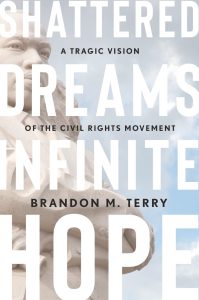Belknap/Harvard
Review by Brian Tanguay

Americans generally frame the Civil Rights era as beginning with the Supreme Court’s Brown v. Board of Education decision and ending with the assassination of Martin Luther King, Jr. The narrative of these years is triumphant, an example of America evolving toward its fundamental creed of liberty and justice for all. In the face of a brutal, unapologetic Jim Crow regime of racial segregation, black people marched, sat-in, walked-out, boycotted, and demanded the equal rights they had fought for during the Civil War and both world wars. Against heavy odds and militant opposition, blacks won important legislative victories, including the 1964 Civil Rights Act and the 1965 Voting Rights Act. Over time, and with repeated telling and reference, this era of racial progress took on romantic overtones.
But these victories were only partial and temporary, and as Harvard scholar Brandon M. Terry writes in his stunning new book, Shattered Dreams, Infinite Hope, the romantic consciousness “congeals into a structure that permits the abdication of political responsibility while narratively conjuring self-satisfaction and moral certitude, even in times of crises where the common sense that once made its worldview plausible erodes under our feet.” The erosion is evident today in the rage directed toward Diversity, Equity, and Inclusion initiatives, critical race theory, the teaching of American history, and a spate of Supreme Court decisions that have chipped away at voting rights. The backlash over the election of America’s first black president is another salient example of this erosion. While a sizable portion of the electorate viewed Barack Obama’s election and tenure in the White House as a critical turn toward a pluralistic, multiracial society, others interpreted Obama’s election as an affront, an aberration, a destabilizing sign of white decline.
Terry does some heavy intellectual lifting in this book, ranging from discussion of Immanuel Kant and Hannah Arendt to John Rawls and Charles W. Mills. He spends the fifty page Introduction and Part One erecting intellectual scaffolding, posing questions like, “Why should a particular event from the past, however dramatically compelling or historically consequential, speak to moral and political judgment here and now?” Readers who are not steeped in political philosophy might struggle with this material, but the concepts allow us to interrogate, evaluate and judge. In building his case for the efficacy of a tragic framework, Terry leans on the writings of A. Philip Randolph, W. E. B. Du Bois, and Martin Luther King, Jr., all of whom understood that progress is neither inevitable or irreversible. “Tragedy, as I develop it here,” Terry writes, “is not despairing. It is a discipline of judgment: a way of seeing and feeling that does not deny hope, but refuses easy optimism. It reckons with the moral ambiguity of means and ends, the partiality of all victories, and the possibility that even the most courageous struggles can end in defeat without rendering their aims meaningless or their insights obsolete.”
According to Terry’s analysis, a tragic frame of reference prepares us to balance celebrations of progress while recognizing what he calls the “defeats within the victories.” The New Deal, for instance, created important regulatory frameworks and programs that helped the working-class, but in most instances the benefits excluded African-Americans. A tragic frame of reference is a bulwark against interpretive failures. A. Philip Randolph worried that the romanticization of partial victories, and the erasure of defeated hopes and ideals imperiled retrospective judgment and further struggle, Terry makes a strong argument for a basic truth: when civil, political or economic rights are won, they must be defended against the inevitable backlash that follows in victory’s wake. Romanticizing the civil rights movement as a completed episode might feel good, but as Americans are witnessing now, rights that seem secure and eternal can be stripped away. In Terry’s analysis, it’s more useful to conceptualize the long civil rights struggle as a continuum, and fashion it as a new standard of critique and action. I don’t disagree, but it seems like a very tall order in a politically polarized nation. Then again, as Terry argues, the tragic framework doesn’t allow for despair in the face of daunting odds. The odds against social progress are always long.
“Tragedy is not concerned with frivolity,” writes Terry, “or easily reconciled matters but with conflicts over weighty questions like those regarding moral responsibility, meaningful relationships, ethics, and character.” Tragedy recognizes, as Martin Luther King did, that all progress is precarious.
